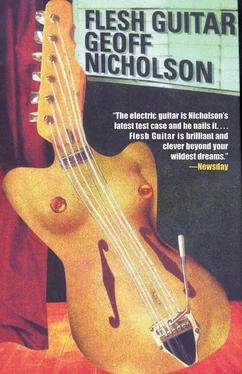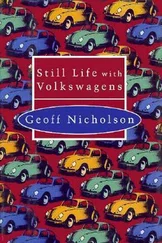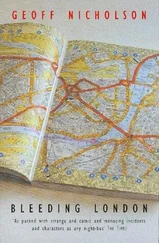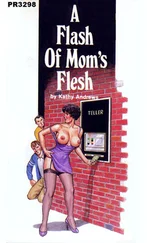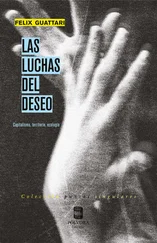‘Well, that’s mighty decent of you, Jackie.’
‘Hey, you’re not taking me seriously.’
‘You noticed.’
‘How can I convince you of my good intentions?’ he replied.
‘I’m not sure that you have good intentions,’ Jenny replied.
‘That’s so untrue, Jenny. I see your long, slender fingers snaking up and down the guitar neck, touching it firmly and precisely, caressing it, coaxing music out of it. I watch you tenderly adjusting the controls. I see your spike-heeled foot slamming down on a stomp box and I want to be that guitar. I want to be that stomp box.’
Jenny looked at him with amusement.
‘You’d better not be all mouth and no trousers,’ she said.
Later, in Room 274 of the Stockholm Holiday Inn, Jackie Brando was as good as his word. He was indeed respectful and healthy and relaxing. He knew what she wanted and he provided it, generously and without complaint, and when they lay together afterwards he said, ‘Isn’t it weird the way people always pull faces when they’re playing guitar. You know, before I was a successful male groupie one of the things I always used to wonder was whether the faces people pulled while they were playing guitar were the same as those they pulled when they were having sex.’
‘And now you know?’ Jenny said.
‘Yeah, now I know there are a lot of fakers out there. They play their guitar as though they’re having some gigantic orgasm, yet when they’re actually having a real orgasm their faces look totally different, not nearly so theatrical, not nearly so convincing.
‘But you, Jenny, you’re no faker; in bed, on stage, hitting the high notes, hitting the orgasm, you’re the same. You’re real.’
‘Gee thanks,’ said Jenny ironically, but she was aware that it wasn’t the worst compliment she’d ever been paid.
Before the night was over she’d been real another half dozen times.
The year is 1954, the setting a hi-fi store in La Mesa, Southern California. There’s no air-conditioning in the store, just a floor-standing fan that distractedly stirs up the thick hot air; and just as distractedly, a fourteen-year-old Frank Zappa comes in from the street to look at the cheap R & B singles in the bargain bin.
As he enters the store he passes a great-looking woman who’s leaving. Frank’s hormones are as unstable as a unicycle and he stops in his tracks to stare. She doesn’t look as though she comes from these parts; it’s something to do with the way she dresses, really modern, almost futuristic, like maybe she’s an air hostess or something else glamorous — well, glamorous for La Mesa. Frank turns his stare into an attempt at a suave, winning smile, like Tony Curtis, or at the very least like Tony Franciosa. Frank’s been practising and he thinks he must be getting it nearly right since the woman almost stops, almost makes eye-contact and almost smiles back.
Frank mooches into the centre of the store, flips through the sale records and decides he’ll take a couple of Joe Houston platters. He feels in his pocket and counts his change to make sure he has enough money for the purchase. The cashier eyes him suspiciously. Frank doesn’t look like a big spender.
‘Who was that woman?’ Frank asks as he arrives at the counter.
‘I dunno,’ the cashier says. ‘Some weird foreign dame. English or something. She wanted me to demonstrate one of the record players. She brought in a special record she wanted to hear played. Then after the demo she told me to keep the record.’
‘What was the record?’ Frank asks.
‘I dunno. Some piece a shit.’
‘What?’
‘It’s crazy stuff. Drumming. Stuff like that.’
‘I like drum music. I play drums. Put it on again. Lemme hear it.’
The cashier finds Frank strangely persuasive. ‘Nah. Well, maybe. Well, OK.’ He takes the record and puts it on a turntable, and the needle clicks down on Edgar Varese’s Ionisation.
Frank listens and hears what sounds like the start of World War Three. It’s jarring and tense, all sharp edges and metallic collisions, but simultaneously there’s space and light. It’s wild and scary and funny, holy and pagan, all at the same time. It’s the stuff of his dreams, the stuff that fills his head, that he lives with every day. Al looks at him and thinks the kid’s going to have a seizure or something.
‘Actually,’ the cashier says, ‘the stereo effect ain’t bad. Maybe I’ll keep it to use as a demonstration record.’
‘No,’ says Frank. ‘I have to have this record. I need it. This is the sound I’ve been waiting for all my life.’
The cashier thinks of arguing, but why bother? It’s too hot, and he suspects the kid’s going to get his own way in the end. And what the hell, it’s only a record.
‘That’s all I’m here for, kid,’ he says. ‘To help complete your education.’
‘Yep, that’s how I see it,’ Frank agrees.
He takes the record and knows he’s taken possession of something that’s going to be with him for the rest of his life, that’s going to be important in defining just what that life is like. He gets home, puts it on the stereo, and from the way his mother and father hate it he knows it’s good.
Two days later he’s walking home from band practice. His head is full of the marching rhythms he’s been practising, but mixed in with them are greasy rock and roll, doo wop and, of course, Varese. He takes the long way home, goes right to the far edge of town, this town which is all edge and no centre, and just as he’s deciding he can’t delay his return any longer he sees a car stopped up ahead with the hood raised and someone peering into the engine. He doesn’t recognize the car, not even the model, it must be some sort of European job; and then he sees, no, it can’t be, he’s never been that lucky, there’s a woman peering helplessly under the hood. Then he sees she’s the one he smiled at in the hi-fi store. This is fantastic. This is fate.
‘Car trouble?’ he asks.
‘Looks like it,’ she says.
‘I don’t know much about cars,’ Frank says, ‘but I’d be happy to take a look.’
And now she does smile at him, the full-strength version, as though someone’s turned on a spotlight and shone it right into Frank’s eyes. ‘Thanks.’ Frank looks under the hood and sees that one of the sparkplug leads is loose. It all seems too easy, too good to be true, but he connects the lead and feels very proud of himself.
‘You’re brilliant,’ she says. ‘My name’s Jenny Slade, by the way. You’re Frank, aren’t you?’
‘Well yes, but …’
‘I was just driving around,’ says Jenny. ‘Need a ride?’
Oh boy. Frank gets in beside her and she sets the car in motion, finds some so-so jazz on the car radio and drives with one hand, looking so good, so sexy, so cool. Frank tries hard to imitate her.
‘That was a great record you left behind,’ he says.
‘I’m glad you liked it. I knew you would.’
‘Yeah?’
‘What are you planning to do when you grow up, Frank?’
He doesn’t like the tone of that question at all. It suggests that she doesn’t think he’s an equal, that she’s the adult and he’s just a kid.
‘I’d like to be a musician, but I know it’s a tough business. ‘You want some advice?’ she asks.
Frank is not normally given to listening to advice, especially not from the likes of his dad or his teachers, but this woman isn’t quite like them.
‘Well, I don’t mind hearing it, just so long as I don’t have to take it.’
She grins. That’s fine. That’s her boy.
‘First thing,’ she says, ‘keep the name. Zappa.’
Читать дальше
